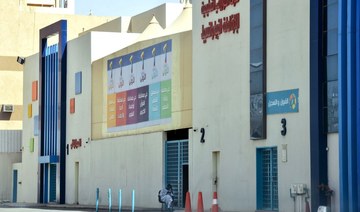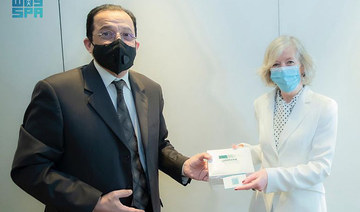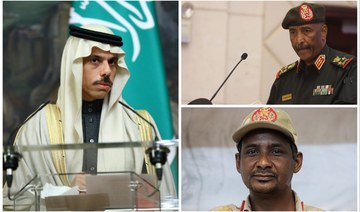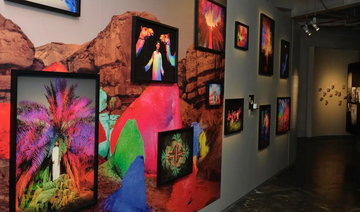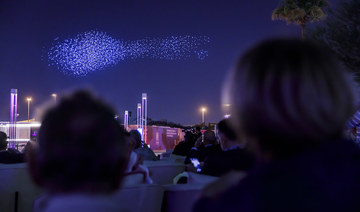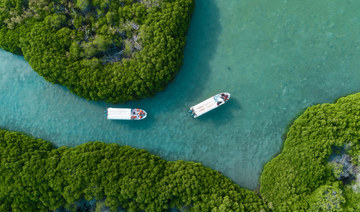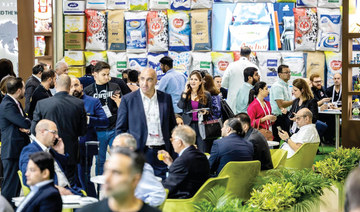MAKKAH: Dyslexia, a learning disorder characterized by difficulty with reading, is common but for many years there was a widespread lack of awareness about it in Saudi Arabia. As a result people with the condition often did not get the help they needed.
This has changed significantly in recent years thanks to community-awareness campaigns, through which Saudis have learned more about the condition. This is helping with early recognition and intervention but challenges remain.
This month is Dyslexia Awareness Month, and to mark the occasion advocates and campaign groups in the Kingdom are stepping up their efforts to educate the community and show how knowledge is key to changing the narrative about people with learning difficulties.
According to specialists and people with dyslexia, media awareness campaigns in the past few years and the decision by Saudi authorities last September to officially classify it as a learning disorder have helped to improve the rights of people with the condition. They also said that modern diagnostic techniques mean that official figures for dyslexia in Saudi Arabia are much more accurate than they once were.
The condition was identified in 1881 by Dr. Rudolf Berlin, a German ophthalmologist in Stuttgart. A pioneer in his field, he was the first to describe it, and give it a name, in his paper Eine Besondere Art der Wortblindheit: Dyslexie (A Special Type of Word Blindness: Dyslexia), which was published in 1887. This formed the basis for all subsequent research, thanks to his systematic description of the condition.
Dr. Muhannad Al-Ali, a neurologist at King Fahd Hospital in Jeddah, said that dyslexia is a newly prevalent disorder in the Kingdom, meaning that until recently it was not classified as a condition. The amount of research carried out since the 1990s globally remains modest, he added.
Many people with dyslexia are unaware they have condition, he said, since the amount of time we spend on traditional forms of reading has declined. As a result, it can be difficult to accurately diagnose.
“Dyslexics find it difficult to comprehend what they read,” Al-Ali told Arab News. “They can read the first line but get tired and lose focus when reading the next.
“It is possible for a dyslexic to be able to read WhatsApp messages, for example, but unable to read a book or articles.” He further explained that because dyslexia does not have clear, consistent medical criteria associated with it, there is no specific, definitive test to diagnose it.
This can result in years of suffering by patients who later in life finally discover they have dyslexia, Al-Ali added.
“It arises with the child’s upbringing and often has roots in the area of the brain that handles comprehension, reading and cognition, and there are studies showing genetic and hereditary factors, but there is no clear and direct reason as to why a person has dyslexia,” he said.
Recent studies have clarified the significant role of functional magnetic resonance imaging of brain activity in determining the nature of the condition, Al-Ali explained.
This could be promising since cognitive behavioral therapy — in which a therapist provides a model for an appropriate behavioral response to a situation and the patient tries to copy that, receiving feedback on their attempt — has had significant benefits for some people with dyslexia.
Ibtisam Al-Samali, who is dyslexic and works as an engineer, said that community awareness is still at an early stage, but the situation is improving thanks to the good work of campaigners.
But she added that accurate figures for the number of people with dyslexia in Saudi Arabia are not available as the country lacks a unified, accredited body to identify and monitor people with the condition.
Al-Samali said she only learned about dyslexia when she was at university. Describing it as an invisible disability, she praised the efforts of civil society institutions and businesses to make a difference to people with the condition. She highlighted in particular the efforts of STC Pay which, as part of a community partnership, is helping to raise awareness of the condition through messages posted on social media.
“The road ahead is still long, as support is needed to establish the Saudi Dyslexia Society in preparation for setting up specialized schools for future dyslexic students, especially since dyslexics can pass this hereditary disability down to their children,” she told Arab News.
Dr. Yahya Al-Qahtani, an expert in special education and learning difficulties at Sultan bin Abdulaziz Humanitarian City said: “Dyslexia includes stuttering, difficulty and boredom in reading and following numbers and letters, and difficulty in focusing on, listening to and understanding the question. It is a disability that can be overcome through innovative educational strategies and methods.”
He added that although it has been identified widely since the 19th century, the disorder is still not clearly defined and not enough attention has been paid to a number of aspects of it, including medical questions concerning the nerves and behavioral effects.
Al-Qahtani added that Saudi Arabia lags some other nations in identifying people with dyslexia and that diagnosis and evaluation differs between schools, which often rely on older testing methods are not always effective.
A response-to-intervention assessment tool is already in use in some schools in Saudi Arabia and comprises three levels, Al-Qahtani said. The first level includes intensive teaching, to which 80 percent of students respond. The second level employs alternative teaching strategies and methods, which helps 15 percent of students. The third level is the provision of special education services, to which the remaining 5 percent of students respond.
He also highlighted the lack of accurate figures on the number of people with dyslexia in Saudi Arabia. About 400,000 students in the country have learning difficulties, he noted, and dyslexia affects about 40 percent of them.
Mohammad Bahareth, who is dyslexic and the founder of the Saudi-based Dyslexia Initiative, thanked the Human Rights Commission and its president, Awad Al-Awwad, who he credited for the official classification of dyslexia as a learning disorder and obtaining the Ministry of Information’s endorsement of the website www.dyslexia.sa as a source of information for people who want to learn more about the condition.
He also said that Arab News was one of the first newspapers to support the initiative.
Awareness of the learning disorder has improved in Saudi Arabia but experts say more must be done
https://arab.news/4er34
Awareness of the learning disorder has improved in Saudi Arabia but experts say more must be done

Saudi king, crown prince offer condolences to UAE president on key official’s death
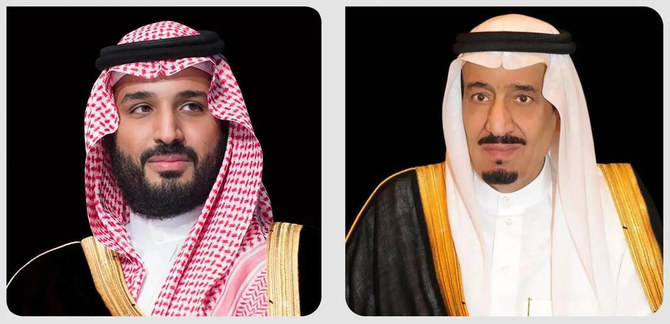
RIYADH: Saudi Arabia's King Salman and Crown Prince Mohammed bin Salman on Thursday offered condolences to the ruler of the United Arab Emirates on the death of a key official and a member of the royal family, the Saudi Press Agency reported.
In a cable to Sheikh Mohammed bin Zayed Al Nahyan, the UAE president, King Salman expressed "our deepest and sincere condolences" on the death of Sheikh Tahnoun bin Mohammed Al Nahyan, Abu Dhabi’s ruler representative in Al Ain, who died on May 1, 2024.
Crown Prince Mohammed bin Salman expressed "my warmest and most sincere condolences" in a separate cable to the UAE leader, the SPA said.
French creatives bring enchanting art experience to Jeddah
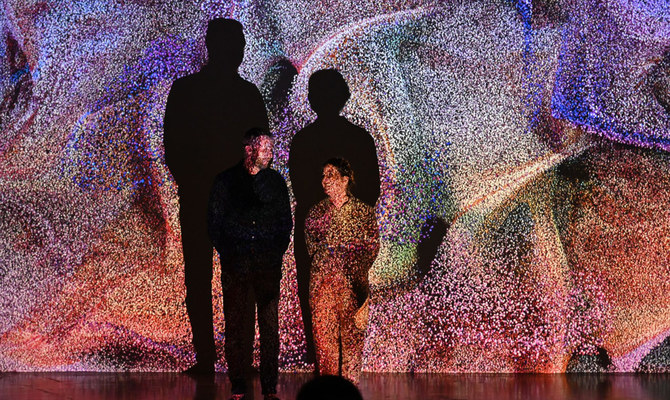
- For ‘ETH3R,’ Paul Marlier translates dancer Jeanne Morel’s graceful movements into digital art
JEDDAH: Artist Paul Marlier and dancer Jeanne Morel have brought an interactive digital art display dubbed “ETH3R” to Jeddah’s cultural hub, Hayy Jameel.
The French creatives feature immersive artworks generated using the biometric data of Morel captured during her movement in extreme environments — including in zero-gravity.
The unique blend of technology and creativity has captivated audiences with its perspectives on reality, and contrasts with the often mundane nature of daily life.
In an interview with Arab News, Marlier spoke about the creative process behind their digital artwork. He also highlighted the production of artworks inspired by the human and scientific data he had gathered.
“It is a real pleasure to be here, particularly in Hayy Jameel, where we blend art and science to create a sensory experience like no other,” he said. “It represents the DNA imprint of the world — the dance of our souls.”

He added: “ETH3R encompasses paintings and dynamic installations derived from the biometric data of my wife, Jeanne Morel, who dances in diverse and extreme environments, from beneath the ocean depths to high-altitude astronaut training.”
Marlier has amalgamated this scientific data regarding human physiology with other information, including air quality, satellite imagery, and even facts from the Red Sea. “These artworks serve as emotional imprints, reminiscent of moments of grace. It’s truly a collaborative effort.”
Explaining the process, he added: “With Jeanne as the catalyst, adorned with sensors akin to a paintbrush, her dance emotions are translated through code into the digital art seen in the paintings. We explore themes of fragility, spirituality, and the inherent unity between humans and nature — the universal dance.”
“We approach data not as mere codification, but as sensations, enabling us to specify and share the experience. By capturing a wealth of information from this singular dancer, we endeavor to materialize the essence of grace,” Marlier said.
Morel added: “Dance is the way to express your deepest emotions, sometimes simpler than words.”
“Dance is the allegory of life. It allows me to stay alive, connected to the movements of the world. Our bodies are constantly dancing, moving, on this earth which itself dances around the sun and remains in balance thanks to gravity,” she added.
Of their first visit to the Kingdom, Marlier said: “The people are absolutely welcoming here. And spirituality and poetry are so present.”
Morel added: “We admire the spirituality and also the open-mindedness of this country regarding art and especially digital art.”
Waleed Harthi, an art enthusiast, said: “Witnessing art that exceeds boundaries was a mesmerizing journey, captivating our senses and sparking wonder at the fusion of art and technology. The live demonstration and dance were incredibly relaxing and offered a serene escape to some other imaginary world.”
The exhibition runs until May 11.
Saudi FM discusses developments in Sudan with army chief, RSF leader

- During the separate calls, the latest developments in the situation in Sudan and their repercussions on the Sudanese people were discussed
RIYADH: Saudi Arabia’s Foreign Minister Prince Faisal bin Farhan spoke with Sudan’s Sovereign Council Chief General Abdel Fattah Al-Burhan and the leader of Sudanese paramilitary Rapid Support Forces Mohamed Hamdan Dagalo on Wednesday.
During the separate calls, the latest developments in the situation in Sudan and their repercussions on the Sudanese people were discussed, Saudi Press Agency reported.
Prince Faisal stressed the importance of working to protect Sudan and its people from further destruction and preventing the worsening of the humanitarian conditions there.
The minister also said it was important to prioritise the interests of the Sudanese people and stop the fighting to protect state institutions and bring about safety in Sudan.
Farasan Island celebrates 20th Hareed Fishing Festival

- Event showcases tourist activities such as parasailing, traditional folk dances
RIYADH: Fishermen from the Jazan region have started preparing for the 20th Hareed Fishing Festival, which begins on Thursday.
The festival, which takes place on Farasan Island and lasts for two days, celebrates the fishing of parrotfish, otherwise known as hareed.
It showcases various tourist activities such as parasailing, traditional folk dances, and competitions for catching the fish, which is difficult due to their survival instinct which leads them to hide by corals.
Hareed are traditionally caught close to the shore in nets. The brightly colored fish come in different sizes and change color as they grow, the color varying according to their sex. They are considered parrot-like as they have teeth that they use to scrape food off coral reefs.
The fishing season varies across the region’s waters. In the past, the people of Farasan celebrated the event by visiting newlywed brides wearing traditional dress, while women and children joined in the festivities at her home.
Visitors to the festival will also get the chance to explore the heritage sites in Farasan, which include Wadi Matar, Al-Qassar village and Bait Al-Jarmal, along with several historic houses.
The island boasts a unique cultural heritage which centers on sailing and pearl-diving experiences in the past.
Jazan Gov. Prince Mohammed bin Nasser is launching the festival, which is organized by the region’s branch of the Ministry of Environment, Water and Agriculture, in partnership with the islands’ governorate.
Mohammed Al-Atif, the general director of the branch, said that the festival embodied the customs and traditions of the people of the Farasan Islands and was considered an annual event to highlight the region’s tourism potential.
He added that the festival also celebrates hareed, which appears at the same time each year and proves a major attraction for people in the Jazan region.
Riyadh hosts food technology and innovation show
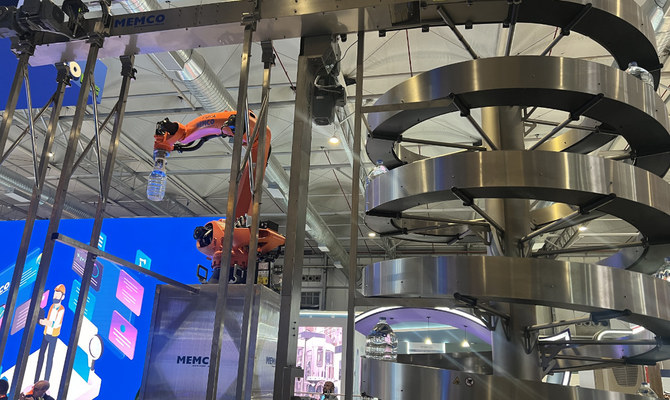
- Industry giants showcase latest in processing, sustainability
RIYADH: More than 400 companies from 35 countries are taking part in the first Saudi Food Manufacturing show, which opened in Riyadh on Tuesday.
Held under the patronage of Saudi Minister of Industry and Mineral Resources Bandar Al-Khorayef, the event focuses on processing, packaging and ingredients and aims to facilitate high level business deals, connections and collaborations.
Three companies that won a Saudi Food Manufacturing Award at the event — Multivac, DC Norris and Brenntag — spoke to Arab News.
Amir Sotoudeh, managing director of Multivac, said the German firm won the Best Processing Innovation Award for its TX series and smart services at Gulfood Manufacturing.
The company has had a branch office in Riyadh since 2009 and the Kingdom is the company’s largest market in the Middle East.
“Saudi Arabia is a significant market, especially in recent years, with major developments focusing on local production and manufacturing. That’s where our technology and expertise as a market leader in processing and packaging are essential.”
DC Norris is a UK-based process equipment company serving 62 countries. It provides solutions for food, dairy and beverage manufacturing and won the Best Processing Manufacturing Award.
Stuart Rigby, product and process technology manager at DC Norris, said the company’s jet cook system, which is used in Saudi Arabia, Qatar, Dubai and Azerbaijan, was able to cook meals two to three times faster than traditional methods.
“It also uses considerably less water, resulting in zero burns, requiring less cleaning and reducing costs. Additionally, it consumes up to 55 percent less energy than traditional cooking methods,” he said.
Brenntag, a 150-year-old German company, is the global market leader in chemical and ingredient distribution. It won the Best Ingredients Innovation Award.
Mahaboob Shaik, technical sales manager at Brenntag, said: “We have replicated the characteristics of regular milk-based proteins and constituents using plant-based alternatives. We’ve developed a Greek-style feta cheese made from plant-based ingredients.
“This helps to reduce allergens like milk proteins in dishes like Caesar salad. Now, when you order a salad at a restaurant, you can enjoy a plant-based cheese, which is entirely vegan.”
Several Saudi manufacturers, including Sapin, Anasia and Memco, are taking part in the show, which provides a platform for companies to exchange ideas.
Majed Al-Argoubi, CEO of the Saudi Authority for Industrial Cities and Technology Zones, said: “The industrial sector is going to increase both the GDP and abilities of youth in the Kingdom.
“We are making impressive growth through Saudi Vision 2030 and Made in Saudi is remarkable for expanding cities across the country and achieving our goals.”
Among the most innovative products on display are the Novamyl BestBite from Novozymes, which improves texture and softness in baked goods while extending shelf life to reduce food waste. Others include sustainable packaging for dates from Napco, a sugar reduction method for fruit juice from Austria Juice, Lactosan, a natural culinary booster from FSL and Biopap, a range of renewable, compostable, high-performance food containers.
Pavilions from Italy, Germany, the Netherlands, US, France, Turkiye and China reflect the international scope of the show, which runs until Thursday.



